高中英语宾语、同位语从句及时态
主语从句、表语从句、宾语从句和同位语从句
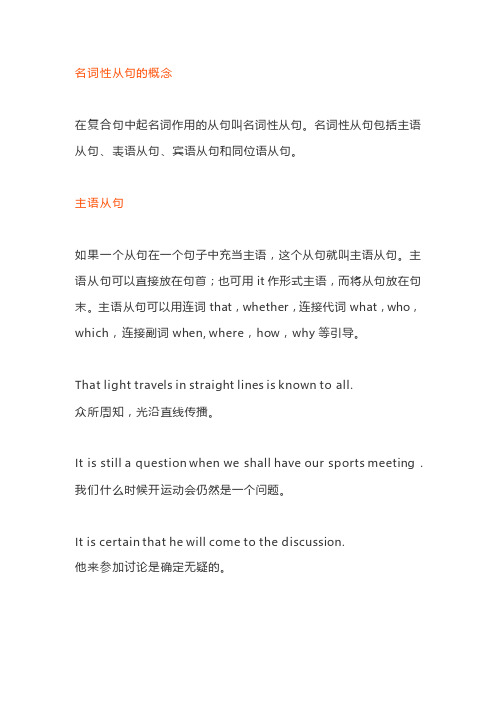
名词性从句的概念在复合句中起名词作用的从句叫名词性从句。
名词性从句包括主语从句、表语从句、宾语从句和同位语从句。
主语从句如果一个从句在一个句子中充当主语,这个从句就叫主语从句。
主语从句可以直接放在句首;也可用it作形式主语,而将从句放在句末。
主语从句可以用连词that,whether,连接代词what,who,which,连接副词when, where,how,why等引导。
That light travels in straight lines is known to all.众所周知,光沿直线传播。
It is still a question when we shall have our sports meeting.我们什么时候开运动会仍然是一个问题。
It is certain that he will come to the discussion.他来参加讨论是确定无疑的。
Whether we discuss the question has yet to be decided.我们是否讨论这个问题还有待决定。
What you bought is an interesting book.你所买的是本有趣的书。
Whenever you come is all right.不管你什么时候来都行。
主语从句的语序与陈述句语序相同,即采用“主语+谓语动词+其他”这样的模式。
宾语从句的结构在句子中起宾语作用的句子叫宾语从句。
宾语从句可作谓语动词的宾语,也可以作介词和某些形容词的宾语。
1.由that引导的宾语从句that在从句中不充当任何句子成分,只起连接主句和从句的作用。
that不用翻译出来,(在口语当中)常可省略。
We all know that we don't have enough medicine.我们都知道我们缺药。
She said that she would drop maths.她说她要放弃数学。
动词的时态与非谓语动词的关联与宾语从句与同位语从句的异同
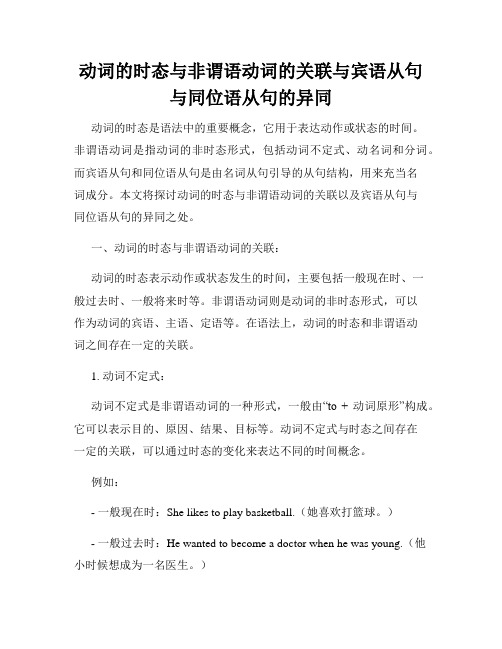
动词的时态与非谓语动词的关联与宾语从句与同位语从句的异同动词的时态是语法中的重要概念,它用于表达动作或状态的时间。
非谓语动词是指动词的非时态形式,包括动词不定式、动名词和分词。
而宾语从句和同位语从句是由名词从句引导的从句结构,用来充当名词成分。
本文将探讨动词的时态与非谓语动词的关联以及宾语从句与同位语从句的异同之处。
一、动词的时态与非谓语动词的关联:动词的时态表示动作或状态发生的时间,主要包括一般现在时、一般过去时、一般将来时等。
非谓语动词则是动词的非时态形式,可以作为动词的宾语、主语、定语等。
在语法上,动词的时态和非谓语动词之间存在一定的关联。
1. 动词不定式:动词不定式是非谓语动词的一种形式,一般由“to + 动词原形”构成。
它可以表示目的、原因、结果、目标等。
动词不定式与时态之间存在一定的关联,可以通过时态的变化来表达不同的时间概念。
例如:- 一般现在时:She likes to play basketball.(她喜欢打篮球。
)- 一般过去时:He wanted to become a doctor when he was young.(他小时候想成为一名医生。
)- 一般将来时:They are going to visit their grandparents next week.(下周他们打算去看望他们的祖父母。
)2. 动名词:动名词是非谓语动词的一种形式,一般由动词的-ing形式构成。
它可以作为主语、宾语、表语或定语等。
与动词的时态关联,动名词通常没有明确的时态概念,而是通过上下文来确定动作发生的时间。
例如:- 一般现在时:Listening to music helps me relax.(听音乐帮助我放松。
)- 一般过去时:I enjoyed playing football when I was a child.(小时候我喜欢踢足球。
)- 一般将来时:She is considering going abroad for further study.(她正在考虑出国深造。
高中英语2024届高考名词性从句知识分类讲解(主语从句+宾语从句+表语从句+同位语从句)
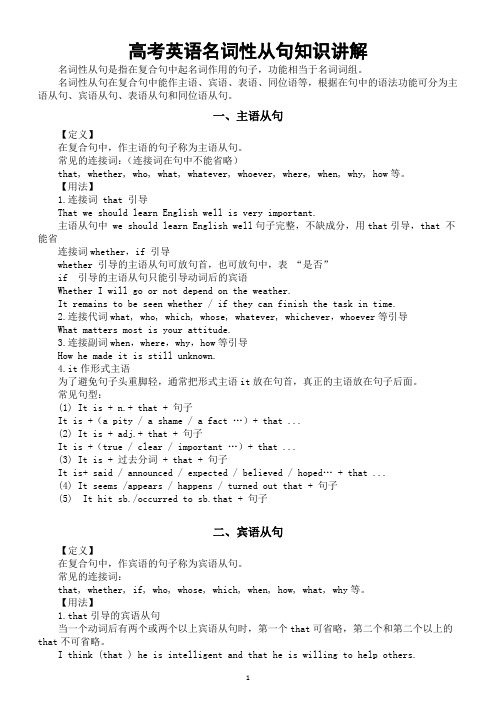
高考英语名词性从句知识讲解名词性从句是指在复合句中起名词作用的句子,功能相当于名词词组。
名词性从句在复合句中能作主语、宾语、表语、同位语等,根据在句中的语法功能可分为主语从句、宾语从句、表语从句和同位语从句。
一、主语从句【定义】在复合句中,作主语的句子称为主语从句。
常见的连接词:(连接词在句中不能省略)that, whether, who, what, whatever, whoever, where, when, why, how等。
【用法】1.连接词 that 引导That we should learn English well is very important.主语从句中 we should learn English well句子完整,不缺成分,用that引导,that 不能省连接词whether,if 引导whether 引导的主语从句可放句首,也可放句中,表“是否”if 引导的主语从句只能引导动词后的宾语Whether I will go or not depend on the weather.It remains to be seen whether / if they can finish the task in time.2.连接代词what, who, which, whose, whatever, whichever,whoever等引导What matters most is your attitude.3.连接副词when,where,why,how等引导How he made it is still unknown.4.it作形式主语为了避免句子头重脚轻,通常把形式主语it放在句首,真正的主语放在句子后面。
常见句型:(1) It is + n.+ that + 句子It is +(a pity / a shame / a fact …)+ that ...(2) It is + adj.+ that + 句子It is +(true / clear / important …)+ that ...(3) It is + 过去分词 + that + 句子It is+ said / announced / expected / believed / hoped… + that ...(4) It seems /appears / happens / turned out that + 句子(5) It hit sb./occurred to sb.that + 句子二、宾语从句【定义】在复合句中,作宾语的句子称为宾语从句。
同位语从句和宾语从句的区别

同位语从句和宾语从句的区别同位语从句和宾语从句是英语语法中两个重要的句子结构。
虽然它们都可以用来承担从句的语法功能,但它们在句子结构上有一些区别。
本文将详细介绍同位语从句和宾语从句的区别。
一、同位语从句同位语从句是指在句子中作为同位语的从句。
同位语从句通常用来解释或补充前面的名词或代词。
同位语从句以及它所解释的名词或代词通常是同一个句子的成分,共同构成一个整体的句子结构。
首先,同位语从句通常由连词"that"引导。
"that"在同位语从句中往往可以省略。
同位语从句可以出现在名词的后面,对名词进行解释或者重新表达。
例如:1. 我的问题是,你去哪里了?2. 我听到的消息是,她考上了大学。
在这些例子中,同位语从句分别解释了"问题"和"消息"。
另外,同位语从句通常是不可改变的固定表达,不会改变句子的词序,并且它们一般不会出现感叹句或疑问句中。
接下来,我们将介绍宾语从句。
二、宾语从句宾语从句是指在句子中作为宾语的从句。
宾语从句通常用来承担动词或介词后的宾语,并完成宾语从句所陈述的内容。
宾语从句和主句之间存在着一种从属关系。
与同位语从句不同的是,宾语从句并不像同位语从句那样与名词或代词构成一个整体的句子结构。
宾语从句的结构可以相对独立,它本身就是一个完整的句子。
宾语从句一般由连词"that"引导,但在口语中通常可以省略。
此外,宾语从句的位置可以出现在及物动词或介词之后,并且动词的选择通常与宾语从句的内容和意义相对应。
例如:1. 她知道你在做什么。
2. 他们问我是否同意他们的计划。
在这些例子中,宾语从句分别作为动词"知道"和"问"的宾语,完成了相应的意思表达。
综上所述,同位语从句和宾语从句虽然在语法功能上有相似之处,但在句子结构上存在一些区别。
同位语从句通常用来解释或补充名词,其结构与名词相互依存;而宾语从句则作为动词或介词的宾语,其结构相对独立。
高中-宾语从句
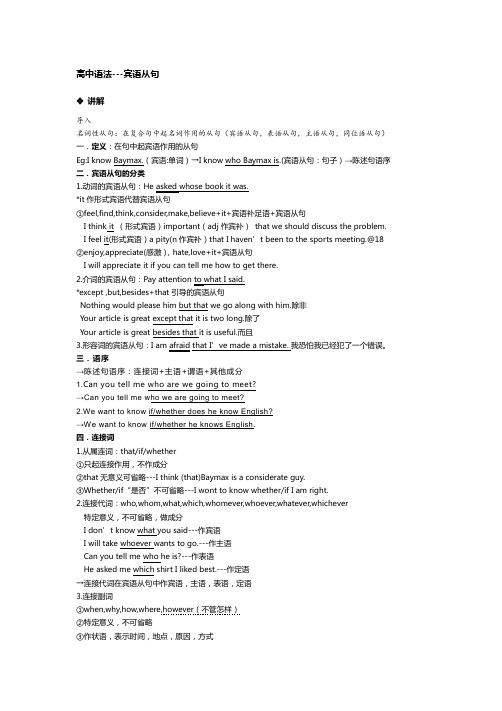
高中语法---宾语从句讲解导入名词性从句:在复合句中起名词作用的从句(宾语从句,表语从句,主语从句,同位语从句)一.定义:在句中起宾语作用的从句Eg:I know Baymax.(宾语:单词)→I know who Baymax is.(宾语从句:句子)→陈述句语序二.宾语从句的分类1.动词的宾语从句:He asked whose book it was.*it作形式宾语代替宾语从句①feel,find,think,consider,make,believe+it+宾语补足语+宾语从句I think it (形式宾语)important(adj作宾补)that we should discuss the problem.I feel it(形式宾语)a pity(n作宾补)that I haven’t been to the sports meeting.@18②enjoy,appreciate(感激),hate,love+it+宾语从句I will appreciate it if you can tell me how to get there.2.介词的宾语从句:Pay attention to what I said.*except ,but,besides+that引导的宾语从句Nothing would please him but that we go along with him.除非Your article is great except that it is two long.除了Your article is great besides that it is useful.而且3.形容词的宾语从句:I am afraid that I’ve made a mistake. 我恐怕我已经犯了一个错误。
三.语序→陈述句语序:连接词+主语+谓语+其他成分1.Can you tell me who are we going to meet?×→Can you tell me who we are going to meet?2.We want to know if/whether does he know English?×→We want to know if/whether he knows English.四.连接词1.从属连词:that/if/whether①只起连接作用,不作成分②that无意义可省略---I think (that)Baymax is a considerate guy.③Whether/if“是否”不可省略---I wont to know whether/if I am right.2.连接代词:who,whom,what,which,whomever,whoever,whatever,whichever特定意义,不可省略,做成分I don’t know what you said---作宾语I will take whoever wants to go.---作主语Can you tell me who he is?---作表语He asked me which shirt I liked best.---作定语→连接代词在宾语从句中作宾语,主语,表语,定语3.连接副词①when,why,how,where,however(不管怎样)②特定意义,不可省略③作状语,表示时间,地点,原因,方式Please tell me when you will leave.---修饰leave,状语表时间@4I don’t know where he will arrive.---地点状语#3Do you know why he is late?---原因状语Please tell me how I can get there.---方式状语#4五.时态1.主句为一般现在时/一般将来时,从句用任何时态①She says that she works all day一般现在时一般现在she will pay a visit to her father.一般将来时she has never been to Beijing.现在完成时②I will tell you how you can keep healthy.一般现在时一般将来when the meeting will start.一般将来时2.主句是一般过去时,从句用相应的过去时态①He said that he was studying in a western country.过去进行时-主从句谓语动作同时发生-said,study同时②He said to me that he had told Mary about the meeting already.过去完成时-从句动作发生在主句之前-先told后said③He said that he would take care of the baby.过去将来时-从句动作发生在主句之后-先said后take3.从句中有具体时间状语,表真实过去,即使从句动作发生在主句动作前,仍然用一般过去时。
高中英语语法---名词性从句详解
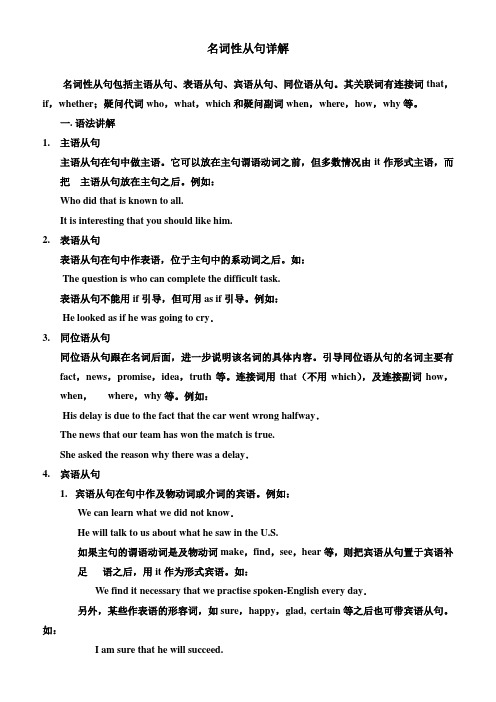
名词性从句详解名词性从句包括主语从句、表语从句、宾语从句、同位语从句。
其关联词有连接词that,if,whether;疑问代词who,what,which和疑问副词when,where,how,why等。
一.语法讲解1.主语从句主语从句在句中做主语。
它可以放在主句谓语动词之前,但多数情况由it作形式主语,而把主语从句放在主句之后。
例如:Who did that is known to all.It is interesting that you should like him.2.表语从句表语从句在句中作表语,位于主句中的系动词之后。
如:The question is who can complete the difficult task.表语从句不能用if引导,但可用as if引导。
例如:He looked as if he was going to cry.3.同位语从句同位语从句跟在名词后面,进一步说明该名词的具体内容。
引导同位语从句的名词主要有fact,news,promise,idea,truth等。
连接词用that(不用which),及连接副词how,when,where,why等。
例如:His delay is due to the fact that the car went wrong halfway.The news that our team has won the match is true.She asked the reason why there was a delay.4.宾语从句1.宾语从句在句中作及物动词或介词的宾语。
例如:We can learn what we did not know.He will talk to us about what he saw in the U.S.如果主句的谓语动词是及物动词make,find,see,hear等,则把宾语从句置于宾语补足语之后,用it作为形式宾语。
高中从句语法知识点总结
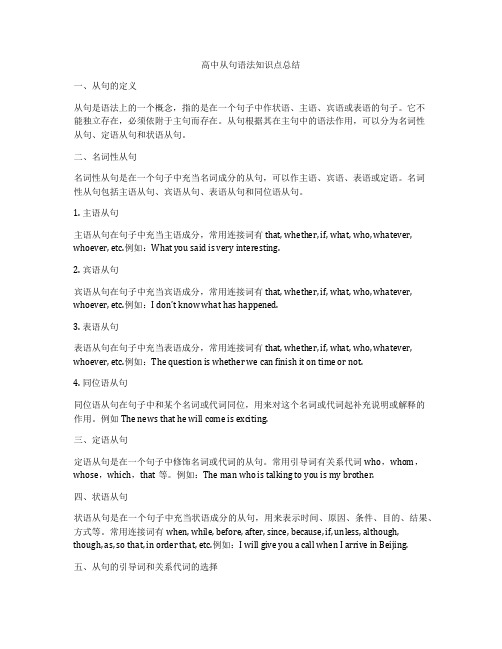
高中从句语法知识点总结一、从句的定义从句是语法上的一个概念,指的是在一个句子中作状语、主语、宾语或表语的句子。
它不能独立存在,必须依附于主句而存在。
从句根据其在主句中的语法作用,可以分为名词性从句、定语从句和状语从句。
二、名词性从句名词性从句是在一个句子中充当名词成分的从句,可以作主语、宾语、表语或定语。
名词性从句包括主语从句、宾语从句、表语从句和同位语从句。
1. 主语从句主语从句在句子中充当主语成分,常用连接词有that, whether, if, what, who, whatever, whoever, etc.例如:What you said is very interesting.2. 宾语从句宾语从句在句子中充当宾语成分,常用连接词有that, whether, if, what, who, whatever, whoever, etc.例如:I don’t know what has happened.3. 表语从句表语从句在句子中充当表语成分,常用连接词有that, whether, if, what, who, whatever, whoever, etc.例如:The question is whether we can finish it on time or not.4. 同位语从句同位语从句在句子中和某个名词或代词同位,用来对这个名词或代词起补充说明或解释的作用。
例如The news that he will come is exciting.三、定语从句定语从句是在一个句子中修饰名词或代词的从句。
常用引导词有关系代词who,whom,whose,which,that等。
例如:The man who is talking to you is my brother.四、状语从句状语从句是在一个句子中充当状语成分的从句,用来表示时间、原因、条件、目的、结果、方式等。
常用连接词有when, while, before, after, since, because, if, unless, although, though, as, so that, in order that, etc.例如:I will give you a call when I arrive in Beijing.五、从句的引导词和关系代词的选择1. 当主句是一般现在时或一般将来时,从句的时态可以随意变换(即使用某一特定时态的从句并不影响主句动词的时态)。
1753 宾语从句和同位语从句

名词性从句(三)宾语从句二.宾语从句中引导词的用法连词:that (that 常可省略),whether, if代词:who, whose, what ,which,whoever, whomever, whatever, whichever副词:when ,where, how, why 等。
(一)that引导的宾语从句,that不做成分,只起引导词的作用, that可以省略e.g.The boy believes that he will travel through space to other planets.Li Tao thought (that) the TV play was interesting.___________________________________________________________________________ 我听说他将要去美国了。
______________________________________________________________________他告诉我他明年上大学.注意事项:1.当主句谓语动词是think, believe, suppose, expect等词且主语为第一人称,而宾语从句的意思是否定时,常把否定转移至主句表示。
e.g.I don’t think it is right for him to treat you like that.__________________________________________________________ 我认为他明天不会来。
____________________________________________________________我们认为她本不应该犯那样的错。
2.在以下情况中that不能省略(1)当句中的动词后接多于两个由that引导的宾语从句时,第一个that可省,但后面的that不可省。
总结定语从句 同位语从句 宾语从句 表语从句 主语从句的异同

2.Whether ,if 引导宾语从句:两词可互换,但是下列情形除外:
(注意:当who为主语时,句式为:who+谓语+其他)
2.判断时态情况:
1.主句是一般现在时,从句为各种时态情况。
2.主句是一般过去时,从句为各种相应过去时态注意:从句描绘客观事实,用一般现在时。
eg: The soldiers soon reached( )was once an old temple( )the villagers used as a school. A.which;where B.what;which C.where;which D.what;where
宾语从句用作宾语。
如:Do you know where he lives?
定语从句相当于一个形容词,用于修饰前面的名词。
如:The student who answered the question was John. 回答问题的学生是John.
This is the man whom he is looking for. Do you know the girl who is in red? 语
(1)whether从句中有or not
(2)whether从句做介词宾语 Everything depends on whether you agree with us
高中英语知识点归纳同位语从句与宾语从句的区别
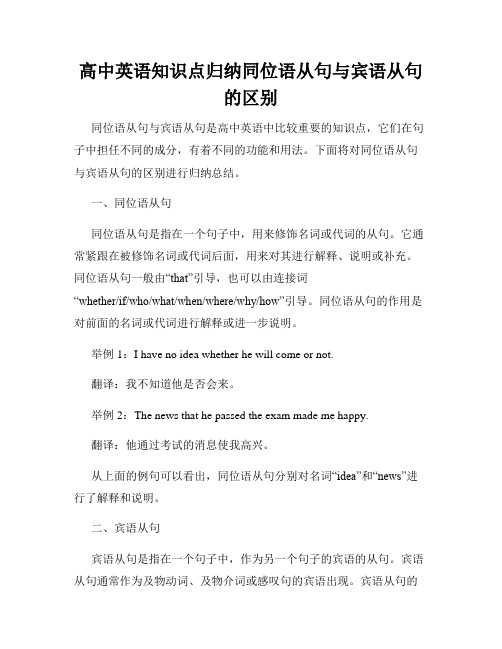
高中英语知识点归纳同位语从句与宾语从句的区别同位语从句与宾语从句是高中英语中比较重要的知识点,它们在句子中担任不同的成分,有着不同的功能和用法。
下面将对同位语从句与宾语从句的区别进行归纳总结。
一、同位语从句同位语从句是指在一个句子中,用来修饰名词或代词的从句。
它通常紧跟在被修饰名词或代词后面,用来对其进行解释、说明或补充。
同位语从句一般由“that”引导,也可以由连接词“whether/if/who/what/when/where/why/how”引导。
同位语从句的作用是对前面的名词或代词进行解释或进一步说明。
举例1:I have no idea whether he will come or not.翻译:我不知道他是否会来。
举例2:The news that he passed the exam made me happy.翻译:他通过考试的消息使我高兴。
从上面的例句可以看出,同位语从句分别对名词“idea”和“news”进行了解释和说明。
二、宾语从句宾语从句是指在一个句子中,作为另一个句子的宾语的从句。
宾语从句通常作为及物动词、及物介词或感叹句的宾语出现。
宾语从句的引导词多样,根据从句的内容不同可以使用“that/whether/if/who/whom/whose/what/which/how”等连接词。
宾语从句的作用是充当句子中的宾语,起到进一步说明或补充主句意思的作用。
举例1:She asked me if I had finished my homework.翻译:她问我是否完成了作业。
举例2:I don't know what he is doing.翻译:我不知道他在做什么。
从上面的例句可以看出,宾语从句分别作为动词“ask”和“know”的宾语出现,进一步说明了主句的意思。
三、同位语从句与宾语从句的区别1. 位置不同:同位语从句紧跟在被修饰的名词或代词之后,而宾语从句则作为动词的宾语出现在主句中。
宾语从句与同位语从句的异同

宾语从句与同位语从句的异同在英语语法中,宾语从句和同位语从句是两个常见的从句类型。
它们在句子结构和用法上有一些相似之处,但也存在一些明显的异同点。
本文将对宾语从句和同位语从句进行比较和总结,以便更好地理解和运用它们。
一、宾语从句宾语从句是作为主句的宾语出现的从句,通常用于表示动词后的宾语。
1. 句子结构:宾语从句一般由连接词引导,常见的连接词有:(1) 连接代词:that, whether, if等。
(2) 连接副词:how, when, where, why等。
宾语从句需要有主语和谓语,构成一个完整的句子。
2. 用法:宾语从句常用于以下情况:(1) 及物动词的宾语:例如,I know that he is a doctor.(2) 形容词的宾语:例如,I am happy that you passed the exam.(3) 名词的宾语:例如,She has no idea what to do.3. 语序:宾语从句的语序与陈述句或疑问句的语序相同,即主语在前,谓语在后。
特殊疑问句和一般疑问句在宾语从句中不需要变化。
二、同位语从句同位语从句是用来解释或补充说明先行词的从句,通常放在名词后面,起到同位语的作用。
1. 句子结构:同位语从句一般由连接词that引导,连接词that在同位语从句中没有实际的意义,仅起连接作用。
2. 用法:同位语从句常用于以下情况:(1) 说明名词的具体内容或含义:例如,The fact that he passed the exam surprised me.(2) 解释名词的性质或特点:例如,Her belief that everyone deserves equal opportunities is admirable.(3) 补充说明名词的身份或身份:例如,His claim that he is innocent is being investigated.3. 语序:同位语从句的语序通常保持与原句相同。
同位语从句和宾语从句的详细区分

同位语从句和宾语从句的详细区分同位语从句和宾语从句是英语语法中两个重要的句法结构。
虽然它们都属于从句,但它们在语法功能和用法上有着明显的差异。
本文将详细区分同位语从句和宾语从句,并从语法结构、引导词、意义和用法等方面进行解析。
一、同位语从句的定义及特点同位语从句是指在名词或代词后面用以解释或说明该名词或代词的从句。
它的作用是对名词或代词进行进一步的解释、说明或补充。
同位语从句与主句之间往往存在着平行的关系。
同位语从句的引导词通常有“that”、“whether”、“if”等,它们在从句中起连接作用。
同位语从句常用于表示观点、证明、描写等方面,用以加强语气或补充信息。
例如:1. I have no idea whether he will come or not.(我不知道他是否会来。
)2. The fact that he passed the exam surprised me.(他通过了考试的事实让我吃惊。
)3. Our hope is that the new project will be successful.(我们的希望是新项目会成功。
)二、宾语从句的定义及特点宾语从句是指在句子中作动词的宾语,并且在结构上是一个完整的句子。
它的作用是接受动作的影响,表达说话人对一个事实、看法、意愿或建议等的陈述或询问。
宾语从句的引导词通常有“that”、“whether”、“if”、“what”、“who”等,根据不同的引导词,可以表达不同的含义和作用。
宾语从句常用于陈述性动词、描写性动词、感知性动词、思维性动词等后面,用以表达说话人的意向、观点、看法等。
例如:1. She didn't know what he was talking about.(她不知道他在说什么。
)2. I wonder if/whether he can come to the party.(我想知道他是否能来参加派对。
从句归纳 区分定语从句宾语从句同位语从句
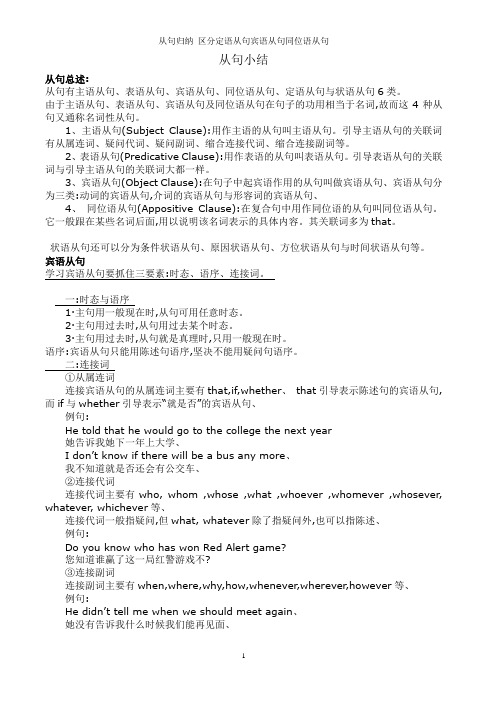
从句小结从句总述:从句有主语从句、表语从句、宾语从句、同位语从句、定语从句与状语从句6类。
由于主语从句、表语从句、宾语从句及同位语从句在句子的功用相当于名词,故而这4种从句又通称名词性从句。
1、主语从句(Subject Clause):用作主语的从句叫主语从句。
引导主语从句的关联词有从属连词、疑问代词、疑问副词、缩合连接代词、缩合连接副词等。
2、表语从句(Predicative Clause):用作表语的从句叫表语从句。
引导表语从句的关联词与引导主语从句的关联词大都一样。
3、宾语从句(Object Clause):在句子中起宾语作用的从句叫做宾语从句、宾语从句分为三类:动词的宾语从句,介词的宾语从句与形容词的宾语从句、4、同位语从句(Appositive Clause):在复合句中用作同位语的从句叫同位语从句。
它一般跟在某些名词后面,用以说明该名词表示的具体内容。
其关联词多为that。
状语从句还可以分为条件状语从句、原因状语从句、方位状语从句与时间状语从句等。
宾语从句学习宾语从句要抓住三要素:时态、语序、连接词。
一:时态与语序1·主句用一般现在时,从句可用任意时态。
2·主句用过去时,从句用过去某个时态。
3·主句用过去时,从句就是真理时,只用一般现在时。
语序:宾语从句只能用陈述句语序,坚决不能用疑问句语序。
二:连接词①从属连词连接宾语从句的从属连词主要有that,if,whether、that引导表示陈述句的宾语从句,而if与whether引导表示“就是否”的宾语从句、例句:He told that he would go to the college the next year她告诉我她下一年上大学、I don’t know if there will be a bus any more、我不知道就是否还会有公交车、②连接代词连接代词主要有who, whom ,whose ,what ,whoever ,whomever ,whosever, whatever, whichever等、连接代词一般指疑问,但what, whatever除了指疑问外,也可以指陈述、例句:Do you know who has won Red Alert game?您知道谁赢了这一局红警游戏不?③连接副词连接副词主要有when,where,why,how,whenever,wherever,however等、例句:He didn’t tell me when we should meet again、她没有告诉我什么时候我们能再见面、三:动词的宾语从句We all expect that they will win , for members of their team are stronger、我们都预料她们会赢,因为她们的队员更强壮、I have found out that all the tickets for the concert have been sold out、我发现这场音乐会的所有票都卖光了、make sure确保make up one’s mind下决心keep in mind牢记例句:Make sure that there are no mistakes in your papers before you turn them in、在上交试卷前确保没有任何错误、四:可运用形式宾语it代替的宾语从句①动词find,feel,consider,make,believe等后面有宾语补足语的时候,则需要用it做形式宾语而将that宾语从句后置、例句:I think it necessary that we take plenty of hot water every day 、我认为每天多喝开水就是有必要的、I feel it a pity that I haven’t been to the get-together、我没去聚会,感觉非常遗憾、②有些动词带宾语从句时寻要在宾语与从句前加it这类动词主要有:hate, take , owe, have, see to、例句:I hate it when they with their mouths full of food、我讨厌她们满嘴食物时说话、五:介词的宾语从句用wh-类的介词宾语从句例句:We are talking about whether we admit students into our club、我们正在讨论就是否让学生加入我们的俱乐部、I know nothing about my new neighbor except that he used to work with a company、对于我的新邻居我只知道她曾在一家公司上班,其她一无所知、六:形容词的宾语从句一般来说形容词不能带宾语,更不能带宾语从句。
高中英语宾语、同位语从句及时态
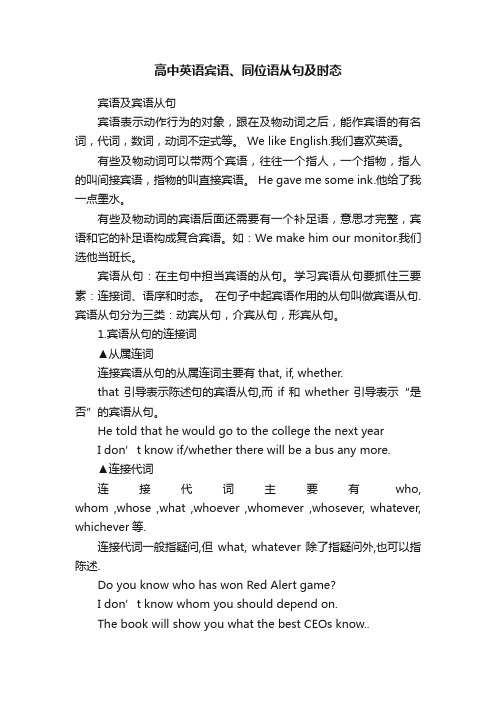
高中英语宾语、同位语从句及时态宾语及宾语从句宾语表示动作行为的对象,跟在及物动词之后,能作宾语的有名词,代词,数词,动词不定式等。
We like English.我们喜欢英语。
有些及物动词可以带两个宾语,往往一个指人,一个指物,指人的叫间接宾语,指物的叫直接宾语。
He gave me some ink.他给了我一点墨水。
有些及物动词的宾语后面还需要有一个补足语,意思才完整,宾语和它的补足语构成复合宾语。
如:We make him our monitor.我们选他当班长。
宾语从句:在主句中担当宾语的从句。
学习宾语从句要抓住三要素:连接词、语序和时态。
在句子中起宾语作用的从句叫做宾语从句.宾语从句分为三类:动宾从句,介宾从句,形宾从句。
1.宾语从句的连接词▲从属连词连接宾语从句的从属连词主要有that, if, whether.that引导表示陈述句的宾语从句,而if和whether引导表示“是否”的宾语从句。
He told that he would go to the college the next yearI don’t know if/whether there will be a bus any more.▲连接代词连接代词主要有who, whom ,whose ,what ,whoever ,whomever ,whosever, whatever, whichever等.连接代词一般指疑问,但what, whatever除了指疑问外,也可以指陈述.Do you know who has won Red Alert game?I don’t know whom you should depend on.The book will show you what the best CEOs know..Have you determined whichever you should buy, a Motorola or Nokia cell phone?▲连接副词连接副词主要有when, where, why, how, whenever, wherever, however等.He didn’t tell me when we should meet again.Could you please tell me how you read the new panel?None of us knows where these new parts can be bought.2.动词的宾语从句▲大多数动词都可以带宾语从句We all expect that they will win, for members of their team are stronger.He told us that they would help us though the whole work.▲部分“动词+副词”结构也可以带宾语从句I have found out that all the tickets for the concert have been sold out.Can you work out how much we will spend during the trip?▲动词短语也可以带宾语从句make sure确保make up one’s mind下决心 keep in mind牢记Make sure that there are no mistakes in your papers before you turn them in.▲可运用形式宾语it代替的宾语从句①动词find, feel, consider, make, believe等后面有宾语补足语的时候,则需要用it做形式宾语而将that宾语从句后置.I think it necessary that we take plenty of hot water every day .I feel it a pity that I haven’t been to the get-together..I have made it a rule that I keep diaries.We all find it important that we (should) make a quickdecision about this mater.②有些动词带宾语从句时要在宾语与从句前加it这类动词有:hate, take , owe, have, see to.I hate it when they with their mouths full of food.I take it thatyou will agree with us.When you start the engine, you must see to it that car is in neutral.③若宾语从句是wh-类,则不可用it代替We all consider what you said to be unbelievable.We discovered what we had learned to be valuable.3.介词的宾语从句▲用wh-类的介词宾语从句We are talking about whether we admit students into our club.The new book is about how Shen zhou 6 manned spaceship was sent up into space.▲用that, if引导的介词宾语从句,有时候except, but, besides三个介词后可见到that引导的宾语从句I know nothing about my new neighbor except that he used to work with a company.4.形容词的宾语从句用来引导宾从的形容词:sure, certain, glad, please, happy, sorry, afraid, satisfied, surprisedI am sure I will pass the exam.I am sorry that I have troubled you so long.5.if,wheter在宾语从句中的区别①if和whether在作“是否”解时,引导宾语从句常放在动词know, ask, care, wonder, find out等之后,介词后一般不用if②少数动词,如:leave, put, discuss ,doubt后的宾语从句常用whether.③whether后可以加or not,但是if不可以.④在不定式前只能用whether. I can’t decide whether to stay.⑤避免歧异时,我们常用whether而不用if.6.哪些宾语从句不可以省略引导词that当that作learn, suggest, explain, agree, wonder, prove, mean, state, feel, hold等动词的宾语时;当宾语从句较长时;当主语状语置于主句尾,宾语从句之前时;当主语谓语动词(包括非谓语动词)与宾语从句之间有插入语时;当一个动词带有两个或两个以上宾语从句时,此时第一个that可以省略,第二个that不可以省略;当宾语从句中的主语是this, that或this, that做主语的定语时;当宾语从句是双宾语中的直接宾语时;当宾语从句的主语是非谓语动词或主语从句时;当主语中的谓语动词是固定词组时;当宾语从句有it做其先行词时;在直接引语中,转述分句把宾语从句隔开时.7.宾语从句的否定转移主句是谓语动词是think, believe, Imagine, suppose, consider, expect, fancy, guess等,并且主句的主语是第一人称而且为一般现在时,从句的否定词一般要转移到主句上来,其反义疑问句一般与宾语从句一致.I don’t think he will come to my party.而不能说成I think he wo n’t come to my party.I don’t believe that man is killed by Jim, is he?如果宾语从句中有某个含有否定意义的形容词或副词,其反义疑问句要用肯定形式.We find that he never listens to the teacher carefully, does he?8.宾语从句的时态和语序当主句为现在时或将来时的时候,宾语从句的时候一般不受主句的时态所影响.当主句为过去时的时候①从句用一般过去时或过去进行时表示与主句谓语动词动作同时发生I only knew he was studying in a western country, but I did n’t know what country he was in.He asked me if I was reading the story The Old Man and the Sea when he was in.②从句过去完成时表示该动作发生在主句谓语动作之前He told me that he had told Mary about the meeting already.③从句谓语用过去将来时表示该动作发生在主句谓语动作之后The reporter asked if the government would take necessary measures to put down the to-do.▲如果从句是一个客观真理,那么从句的时候不根据主句的时态而变化The teacher said that the moon goes around the earth yesterday.▲当宾语从句的引导词是who, which, what, when, where, how, why等表疑问时,不能按正常语序安排,经常将这类引导词置于句首Who do you think the public might choose as their favorite singer this year?●(1)主、从句时态一致,主句谓语过去时,从句相应过去时.主句谓语现在时,从句时态任需;具体过去永不变,真理格言现在时;He told me that he was born in 1980.(2)否定前移,及完成反意问句;在think / believe / suppose / guess / imagine / expect等动词后跟宾语从句否定式时,应转移到主句上去,完成反意问句时,应与从句主、谓保持一致。
同位语、表语、宾语、定语,状语从句分类概要
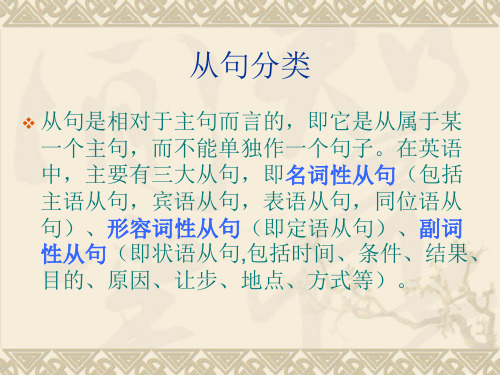
When he will be back depends on the weather. Where we shall hold the meeting will be discussed at today’s meeting. Why he didn't come here is not clear to anyone.
Whoever wants to reach a distant goal must take many small steps.
Whoever dares wins. Whoever seeks obtains. Which way you turn is up to you. Which girl you choose to be your girlfriend is
2.由连接代词who, whose, which, what引导的主语从句.
Which answer is right isn’t known to us. Who damaged the computer is not yet known. Who is to be sent there hasn’t been decided. Whose plan is better has not been discussed.
回答问题的学生)
副词性从句(即状语从句,包括时间、 条件、结果、目的、原因、让步、
地点、方式等)
❖ 状语从句相当于一个副词,如:
When it rains, I usually go to school by bus. 天下雨时,我通常坐公共汽车上学。(时间 状语)
❖ If he comes tomorrow, you will see him. 如果他明天来,你就 可以看见他。(if 引导的条件状语从句,其结构为:if +状语从 句,+主句)。要注意在状语从句中有一个规则是“主将从 现”,即主句是将来时,则从句要用一般现在时表示将来。
宾语从句与同位语从句的句子用法和区别
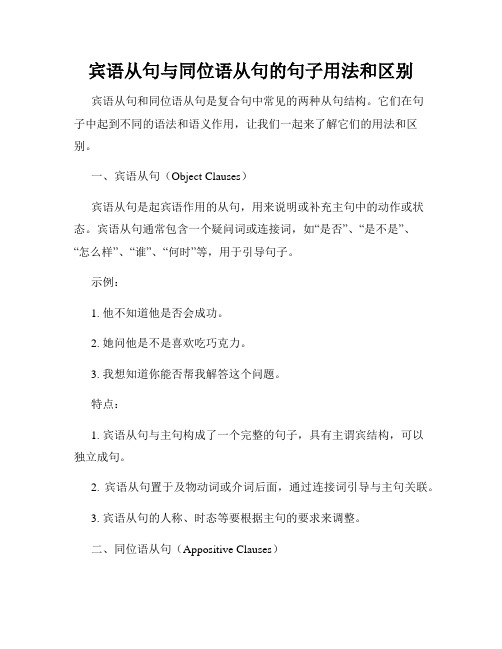
宾语从句与同位语从句的句子用法和区别宾语从句和同位语从句是复合句中常见的两种从句结构。
它们在句子中起到不同的语法和语义作用,让我们一起来了解它们的用法和区别。
一、宾语从句(Object Clauses)宾语从句是起宾语作用的从句,用来说明或补充主句中的动作或状态。
宾语从句通常包含一个疑问词或连接词,如“是否”、“是不是”、“怎么样”、“谁”、“何时”等,用于引导句子。
示例:1. 他不知道他是否会成功。
2. 她问他是不是喜欢吃巧克力。
3. 我想知道你能否帮我解答这个问题。
特点:1. 宾语从句与主句构成了一个完整的句子,具有主谓宾结构,可以独立成句。
2. 宾语从句置于及物动词或介词后面,通过连接词引导与主句关联。
3. 宾语从句的人称、时态等要根据主句的要求来调整。
二、同位语从句(Appositive Clauses)同位语从句用来对前面的名词或名词短语进行解释、说明或补充,它们之间通常用连接代词“关于”、“说”或连接副词“如何”等来引导。
示例:1. 大家都听说了她将会成为新的团队领导者。
2. 我的问题是,你是否明白我们公司的目标。
特点:1. 同位语从句与前面的名词或名词短语之间是一种解释或说明关系,从句本身不能独立成句。
2. 同位语从句通常以逗号隔开,放在名词或名词短语之后。
3. 同位语从句的人称、时态等要根据整个句子的需要来确定。
区别与联系:宾语从句和同位语从句虽然都是从句结构,但它们在用法和句子结构上存在一定的区别。
1. 句子结构宾语从句能够独立成句,具有主谓宾结构,即从句中包含有主语和谓语动词。
而同位语从句不能独立成句,它通常修饰或解释前面的名词或名词短语。
2. 位置要求宾语从句通常紧跟在动词或介词后面,用连接词引导与主句关联。
同位语从句通常以逗号隔开,并放在名词或名词短语之后。
3. 语义作用宾语从句主要是对主句中的动作或状态进行补充说明,提供更多细节。
同位语从句则是对前面的名词或名词短语进行解释、说明或补充。
高中英语知识点归纳同位语从句的用法
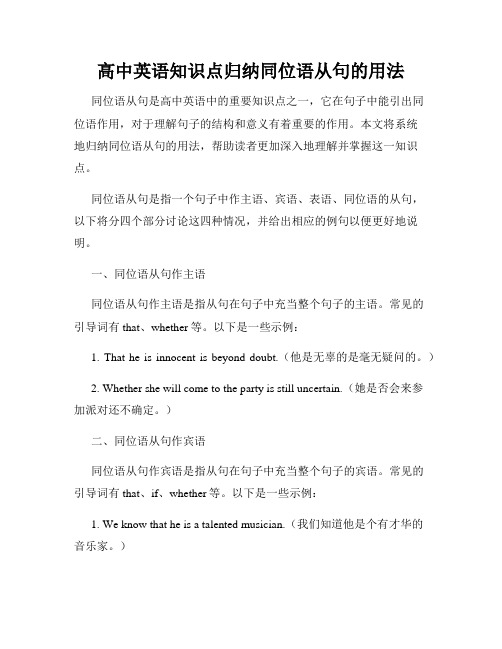
高中英语知识点归纳同位语从句的用法同位语从句是高中英语中的重要知识点之一,它在句子中能引出同位语作用,对于理解句子的结构和意义有着重要的作用。
本文将系统地归纳同位语从句的用法,帮助读者更加深入地理解并掌握这一知识点。
同位语从句是指一个句子中作主语、宾语、表语、同位语的从句,以下将分四个部分讨论这四种情况,并给出相应的例句以便更好地说明。
一、同位语从句作主语同位语从句作主语是指从句在句子中充当整个句子的主语。
常见的引导词有that、whether等。
以下是一些示例:1. That he is innocent is beyond doubt.(他是无辜的是毫无疑问的。
)2. Whether she will come to the party is still uncertain.(她是否会来参加派对还不确定。
)二、同位语从句作宾语同位语从句作宾语是指从句在句子中充当整个句子的宾语。
常见的引导词有that、if、whether等。
以下是一些示例:1. We know that he is a talented musician.(我们知道他是个有才华的音乐家。
)2. I don't know if/whether he can solve the problem.(我不知道他是否能解决这个问题。
)三、同位语从句作表语同位语从句作表语是指从句在句子中充当整个句子的表语。
同位语从句常见的引导词有that、whether等。
以下是一些示例:1. His hope is that he can go abroad to study.(他的希望是能够出国留学。
)2. The truth is whether you like it or not.(事实是无论你喜欢与否。
)四、同位语从句作同位语同位语从句作同位语是指从句在句子中充当名词性的同位语。
常见的引导词有that、whether等。
以下是一些示例:1. The question is whether we should take immediate action.(问题是我们是否应该立即采取行动。
- 1、下载文档前请自行甄别文档内容的完整性,平台不提供额外的编辑、内容补充、找答案等附加服务。
- 2、"仅部分预览"的文档,不可在线预览部分如存在完整性等问题,可反馈申请退款(可完整预览的文档不适用该条件!)。
- 3、如文档侵犯您的权益,请联系客服反馈,我们会尽快为您处理(人工客服工作时间:9:00-18:30)。
2.动词的宾语从句
▲大多数动词都可以带宾语从句
We all expect that they will win, for members of their team are stronger.
▲当宾语从句的引导词是who, ich, what, when, where, how, why等表疑问时,不能按正常语序安排,经常将这类引导词置于句首
Who do you think the public might choose as their favorite singer this year?
I feel it a pity that I haven’t been to the get-together..
I have made it a rule that I keep diaries.
We all find it important that we (should) make a quick decision about this mater.
②有些动词带宾语从句时要在宾语与从句前加it这类动词有:hate, take , owe, have, see to.
I hate it when they with their mouths full of food.
I take it that you will agree with us.
7.宾语从句的否定转移
主句是谓语动词是think, believe, Imagine, suppose, consider, expect, fancy, guess等,并且主句的主语是第一人称而且为一般现在时,从句的否定词一般要转移到主句上来,其反义疑问句一般与宾语从句一致.
I don’t think he will come to my party.而不能说成I think he won’t come to my party.
B.当it作形式宾语时
E g.She made it clear that she had nothing to do with him.
I don’t believe that man is killed by Jim, is he?
如果宾语从句中有某个含有否定意义的形容词或副词,其反义疑问句要用肯定形式.
We find that he never listens to the teacher carefully, does he?
▲可运用形式宾语it代替的宾语从句
①动词find, feel, consider, make, believe等后面有宾语补足语的时候,则需要用it做形式宾语而将that宾语从句后置.
I think it necessary that we take plenty of hot water every day .
Can you work out how much we will spend during the trip?
▲动词短语也可以带宾语从句
make sure确保 make up one’s mind下决心 keep in mind牢记
Make sure that there are no mistakes in your papers before you turn them in.
I don’t know whom you should depend on.
The book will show you what the best CEOs know..
Have you determined whichever you should buy, a Motorola or Nokia cell phone?
When you start the engine, you must see to it that car is in neutral.
③若宾语从句是wh-类,则不可用it代替
We all consider what you said to be unbelievable.
We discovered what we had learned to be valuable.
宾语及宾语从句
宾语表示动作行为的对象,跟在及物动词之后,能作宾语的有名词,代词,数词,动词不定式等。 We like English.我们喜欢英语。
有些及物动词可以带两个宾语,往往一个指人,一个指物,指人的叫间接宾语,指物的叫直接宾语。 He gave me some ink.他给了我一点墨水。
3.介词的宾语从句
▲用wh-类的介词宾语从句
We are talking about whether we admit students into our club.
The new book is about how Shen zhou 6 manned spaceship was sent up into space.
●(1)主、从句时态一致,主句谓语过去时,从句相应过去时.主句谓语现在时,从句时态任需;
具体过去永不变,真理格言现在时;He told me that he was born in 1980.
(2)否定前移,及完成反意问句;
在think / believe / suppose / guess / imagine / expect等动词后跟宾语从句否定式时,应转移到主句上去,完成反意问句时,应与从句主、谓保持一致。(注: 否定前移的条件是,主句主语是第一人称)
③whether后可以加or not,但是if不可以.
④在不定式前只能用whether. I can’t decide whether to stay.
⑤避免歧异时,我们常用whether而不用if.
6.哪些宾语从句不可以省略引导词that
当that作learn, suggest, explain, agree, wonder, prove, mean, state, feel, hold等动词的宾语时;当宾语从句较长时;当主语状语置于主句尾,宾语从句之前时;当主语谓语动词(包括非谓语动词)与宾语从句之间有插入语时;当一个动词带有两个或两个以上宾语从句时,此时第一个that可以省略,第二个that不可以省略;当宾语从句中的主语是this, that或this, that做主语的定语时;当宾语从句是双宾语中的直接宾语时;当宾语从句的主语是非谓语动词或主语从句时;当主语中的谓语动词是固定词组时;当宾语从句有it做其先行词时;在直接引语中,转述分句把宾语从句隔开时.
He asked me if I was reading the story The Old Man and the Sea when he was in.
②从句过去完成时表示该动作发生在主句谓语动作之前
He told me that he had told Mary about the meeting already.
▲连接代词
连接代词主要有who, whom ,whose ,what ,whoever ,whomever ,whosever, whatever, whichever等.
连接代词一般指疑问,但what, whatever除了指疑问外,也可以指陈述.
Do you know who has won Red Alert game?
(3)在表示建议 suggest , advise ;要求demand 、desire、require、request、propose; 决定 decide;命令 order、command;坚决主张 insist;等动词后跟宾语从句,用(should)+v.(虚拟语气)
(4)如果宾语从句后有宾语补语,用it作形式宾语,把宾语从句后置
1.宾语从句的连接词
▲从属连词
连接宾语从句的从属连词主要有that, if, whether.
that引导表示陈述句的宾语从句,而if和whether引导表示“是否”的宾语从句。
He told that he would go to the college the next year
I don’t know if/whether there will be a bus any more.
③从句谓语用过去将来时表示该动作发生在主句谓语动作之后The reporter asked if the government would take necessary measures to put down the to-do.
▲如果从句是一个客观真理,那么从句的时候不根据主句的时态而变化
The teacher said that the moon goes around the earth yesterday.
5.if,wheter在宾语从句中的区别
①if和whether在作“是否”解时,引导宾语从句常放在动词know, ask, care, wonder, find out等之后,介词后一般不用if
②少数动词,如:leave, put, discuss ,doubt后的宾语从句常用whether.
▲连接副词
连接副词主要有when, where, why, how, whenever, wherever, however等.
He didn’t tell me when we should meet again.
Could you please tell me how you read the new panel?
He told us that they would help us though the whole work.
